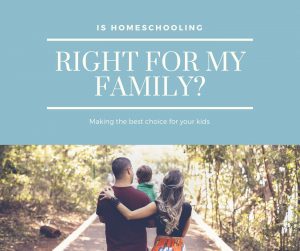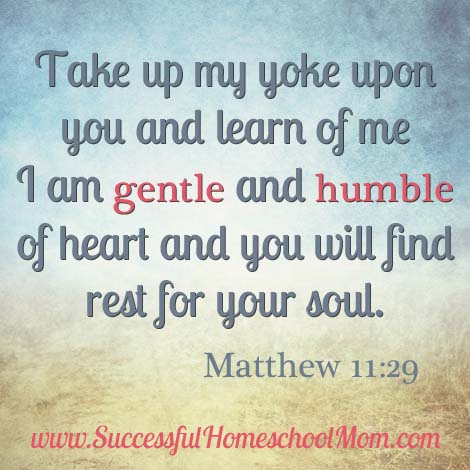
Homeschooling is not for everyone. That may sound funny coming from The Successful Homeschool Mom but the reality is I’ve seen too many families get into homeschooling simply because they thought they should rather than coming to a rational, informed choice about what is best for their family and their kids.
Thankfully today there are so many options and varieties of ways to educate a child, you are no longer stuck between the stereotypical mom at home, wearing a dress, making her own bread, sitting with her 9 children all happily engaged in creative projects that mom designed or public school.
Today’s educational environment is like a buffet with something for every family.
But how do I figure it all out?
There are two main components
1 –What is your Why behind home education? Decide for yourself what a good education should look like based on your individual family lifestyle, goals, values and the best interest of each child.
2 – Research all the various options available.
1 What is your why?
If you don’t have a strong “why” behind your decision to take charge of your child’s education rather than leave it up to the public school, you will bail out when things get tough. I’m not being mean, just sharing what I have experienced over and over after 25 years of helping homeschooling families.
Think through what a good education actually means to you. Does a well-educated child:
Have a lot of facts in their head?
Knows how to learn for them self?
Gets straight A’s?
Has experienced as much of the real world as possible?
Is equipped to navigate adulthood, with financial skills, some car repair knowledge, general life skills, and a willingness to be a contributing member of the community?
Attends Ivy League college and gets into a professional, high paying career?
All of those and more are perfectly valid answers. What is most important to your family?
Why is home education the best choice for the needs of your family?
Answer that question, based on the values you hold most dear, and you’ll have a compelling “why” strong enough to keep you going when things get hard (and they will, no matter which option your chose. If you have a compelling reason why you are doing it, you’ll have the motivation you need to work through the hard times)
Perhaps your child is academically gifted and isn’t being challenged in school. There are several classical education based curriculums that are very rigorous. They don’t necessarily follow traditional grade levels so your child could move through the work at their own pace.
Maybe your child is not strong in academics but is very interested in the arts, or computers, or taking apart motors, or building things, or any one of a hundred other options. There are curriculums which teach kids to master the basics in just 4 hours a day, leaving time to pursue other interests.
If your child is a struggling learner and text books are not working for them, I strongly recommend you read the work of Dr. Howard Gardner on the topic of Multiple Intelligences which explains the 8 different ways people can be smart. Only one of those types excels at traditional school work.
Take into consideration your child’s unique “bent” What are their strengths, weaknesses, interests, and potential? Is college the one and only answer? Could they be destined for a hands-on career that doesn’t require a college education? Is advanced academics going to nurture an exceptional mind, or if they are they more of a creative innovator, will “boring” text books crush their innate love of learning?
Homeschooling can be the best answer for any child who is not getting their needs met in the public school. This applies to kids on both ends of the academic spectrum as well as kids with unique physical, mental or emotional needs.
The practical reality is public schools, by their very nature, have to be predominately one-size-fits-all. There is not enough staff, space, or money to craft a customized education that is truly unique for each child. The school system does the best it can with the limited resources they have, but if your child is gifted, or struggling, they are outside of the norm and will likely not get the kinds of opportunities you can provide at home.
However, there are times and seasons when public school can be the right answer.
- When mom and dad are in deep disagreement about homeschooling
- When a single parent is working 2 jobs, going to school themselves and has young children who cannot work independently
- When life has handed you upheaval, chronic illness or trauma and there just isn’t the mental or physical bandwidth left to do much more than get through the day
- When a child has an exceptional ability or challenge that IS being well served by the school district
- When the parent is feeling forced to homeschool because someone else says it’s the right thing to do “if you truly care” about your kids. That is emotional manipulation and it will only burn you out and potential damage the relationship with your children.
2 What are the options?

Fully online curriculum, online live classes, curriculums that aim to help children learn to self-teach and ones where mom is fully involved in every aspect.

Programs that give you all the books and materials plus daily lesson plans. All mom has to do is open and go.

100% free online complete programs for all ages and abilities with support groups to help.

Millions of free lesson plans and printable worksheets.

Virtual schools, with tutors so you can pick and choose the subjects that meet your child’s interests while teaching other classes yourself.
Isn’t homeschooling for religious fanatics who want to indoctrinate their children and keep them from the real world?
It’s a fact of life with today’s hyper intrusive media that the only homeschool stories we tend to see in the news are about the very few who abuse, neglect or brainwash their children. Bad news, scandal and outrage sells. Happy stories of success don’t attract attention. Consequently there are a lot of misconceptions about homeschooling.
Just like in the public school, there are parents who treat their child in ways society deems despicable and immoral. The fact that some of those parent hid behind the label of homeschooling doesn’t not mean homeschooling is the problem.
Loving, engaged parents care deeply about their children’s future and will choose the best educational options for that child and for the needs of the family. For some that means public school, for some that means home education, and for others it is a hybrid of both.
To get help customizing an educational path that works for your family, contact me for a free consultation


 So, you just got hit by a troll on social media. You had a fight with your spouse. Your kids have been uncooperative all day and your lesson plans are in a shambles. You feel like a total loser who simply can’t handle life. You know you’re in a pit.
So, you just got hit by a troll on social media. You had a fight with your spouse. Your kids have been uncooperative all day and your lesson plans are in a shambles. You feel like a total loser who simply can’t handle life. You know you’re in a pit.


